
Forensic Science Medicine and Pathology
Scope & Guideline
Empowering Professionals with Essential Forensic Insights
Introduction
Aims and Scopes
- Forensic Pathology and Autopsy Studies:
Focused on the analysis of autopsy findings and their implications in determining cause and manner of death, including case reports that highlight unique or complex cases. - Toxicology and Substance Abuse:
Investigates the effects of various substances on human health, particularly in the context of fatal overdoses and poisonings, contributing to the understanding of drug-related deaths. - Forensic Imaging Techniques:
Explores the use of advanced imaging technologies such as CT and MRI in forensic investigations, enhancing the ability to diagnose and analyze injuries postmortem. - Legal and Ethical Aspects of Forensic Medicine:
Addresses the intersection of law and forensic science, discussing the role of forensic experts in legal proceedings and the ethical considerations in forensic investigations. - Innovative Forensic Methodologies:
Emphasizes the development and application of new methodologies in forensic science, including digital techniques, 3D modeling, and novel analytical methods. - Public Health and Forensic Science:
Examines the broader implications of forensic science on public health issues, such as violence, substance abuse, and the impact of pandemics on forensic practices. - Forensic Anthropology and Odontology:
Investigates the application of anthropological and odontological methods in forensic cases, particularly in identification and age estimation.
Trending and Emerging
- Integration of Artificial Intelligence:
The application of AI in forensic science is increasingly prominent, with studies focusing on its potential to enhance accuracy in identification, analysis, and overall investigative processes. - Impact of COVID-19 on Forensic Practices:
Research addressing the implications of the COVID-19 pandemic on forensic medicine has surged, examining changes in practices, challenges faced by forensic professionals, and the effects on public health. - Forensic Microbiology and Genomics:
The exploration of microbiomes and genomic techniques in forensic investigations is on the rise, providing new avenues for evidence collection and analysis. - Digital Forensics and Cybercrime:
As technology advances, there is a growing emphasis on digital forensics, particularly in relation to cybercrime and its implications for traditional forensic practices. - Environmental Forensics:
The intersection of forensic science with environmental issues is becoming more prominent, focusing on cases related to ecological damage, pollution, and wildlife crimes.
Declining or Waning
- Traditional Forensic Techniques:
Conventional methods of forensic analysis, such as basic histopathology and standard toxicology, are increasingly overshadowed by advancements in technology and more sophisticated approaches. - Focus on Historical Cases:
There has been a noticeable decrease in publications centered on historical forensic cases, as the journal shifts towards contemporary issues and modern forensic challenges. - General Crime Scene Investigation:
The journal has moved away from broad crime scene investigation topics, opting instead for more specialized studies that delve deeply into specific aspects of forensic science. - Suicide and Self-harm Studies:
Research specifically focused on suicide methods and self-harm has seen reduced attention, possibly due to the sensitive nature of the subject and a push towards more constructive public health discussions. - Non-accidental Injury Analysis:
While still relevant, the frequency of studies on non-accidental injuries, particularly in children, appears to be diminishing, potentially due to a shift towards broader public health issues.
Similar Journals
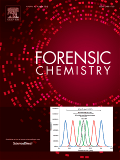
Forensic Chemistry
Exploring the intersection of science and law.Forensic Chemistry is a premier journal published by Elsevier, specializing in the interdisciplinary field of forensic science, with a strong emphasis on analytical and materials chemistry, pathology, and law. Established in 2016 and converging to a significant publication trajectory through 2024, the journal has rapidly ascended to an impressive Q1 ranking across multiple categories, demonstrating its impact and commitment to advancing forensic analysis and methodologies. With an impact factor reflecting its relevance—especially notable with a 95th percentile rank in Social Sciences and Law—Forensic Chemistry serves as an essential resource for researchers, legal authorities, and academics seeking to explore the latest developments in forensic techniques and applications. Its rigorous peer-review process and high-quality publications ensure that it remains at the forefront of scientific inquiry in forensic practices. Access to the journal is available without an open access model, further emphasizing its commitment to curated, high-impact scholarship that contributes to both theoretical foundations and practical applications in the forensic field.
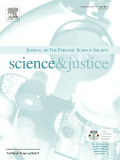
SCIENCE & JUSTICE
Empowering Justice Through Scientific Inquiry.Science & Justice is a leading international journal published by Elsevier Science Ltd, dedicated to the interdisciplinary examination of the intersection of justice and science, especially within the realms of forensic science and pathology. Established in 1995, this reputable journal has garnered a commendable Q2 rank in the category of Pathology and Forensic Medicine, reflecting its significant contributions to advancing knowledge in these critical fields. With an ISSN of 1355-0306 and an E-ISSN of 1876-4452, the journal is indexed in Scopus, positioning it in the top 68th percentile among its peers. The objectives of Science & Justice include promoting research that bridges scientific methodologies with justice-related applications, making it an invaluable resource for researchers, professionals, and students alike. As the journal continues to evolve, it aims to interface scientific innovations with forensic practices, thereby enhancing the integrity of justice processes globally. Despite not offering Open Access options, it remains a pivotal reference point within the academic community focused on forensic science methodologies and their legal implications.
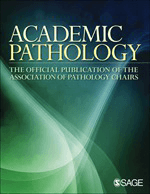
Academic Pathology
Fostering Collaboration for Pathology ProgressAcademic Pathology, published by Elsevier Science Inc, is a prominent open-access journal dedicated to advancing the field of Pathology and Forensic Medicine. Since its inception in 2014, the journal has aimed to provide a platform for high-quality research, fostering collaboration and innovation within the scientific community. With an impact factor that places it in the Q3 category for 2023, it represents a solid resource for researchers, professionals, and students seeking to stay at the forefront of evolving methodologies and practices in pathology. The journal is indexed in Scopus, ranking #117 out of 208 in its category, reflecting its commitment to disseminating valuable findings that enhance clinical and forensic applications. As an accessible source of knowledge, Academic Pathology empowers its readers to refine their studies and contribute novel insights to the ever-growing body of scholarly work in pathology.

Rechtsmedizin
Bridging Clinical Practice and Forensic InvestigationRechtsmedizin is a prestigious academic journal published by Springer, focusing on the critical field of forensic medicine and pathology. With a legacy dating back to 1995, this journal serves as a vital platform for disseminating advanced research and clinical findings that enhance the understanding of legal medicine and forensic science. Although it currently does not offer open access, it boasts an impressive Q3 ranking in 2023 within its category, indicative of its contribution to the field, with a Scopus rank of #149 out of 208 in Medicine, placing it within the 28th percentile of its peers. As a dedicated resource for researchers, professionals, and students, Rechtsmedizin aims to bridge the gap between clinical practice and forensic investigation, promoting the integration of scientific advancements into everyday applications within the legal context. With its location in New York City, USA, the journal remains a key player in the global discourse on forensic issues, thus inviting submissions that push the boundaries of traditional forensic methodologies and explore innovative approaches in legal medicine.

PATHOLOGICA
Exploring Innovations in Pathology for a Healthier Tomorrow.PATHOLOGICA is a leading academic journal dedicated to the field of pathology and forensic medicine, published by PACINI EDITORE. With a rich history dating back to its inception in 1945, the journal has consistently contributed to the advancement of knowledge in these vital areas of medical research and practice. Currently ranked in the Q1 quartile for Pathology and Forensic Medicine and holding an impressive position as #42 out of 208 in the Scopus rankings, it reflects a significant impact within the academic community, boasting an 80th percentile ranking. The journal is committed to publishing high-quality, peer-reviewed articles that explore innovative research findings and clinical advancements, making it an essential resource for researchers, clinicians, and students alike. Though it does not offer open access, PATHOLOGICA continues to foster scholarly communication by disseminating cutting-edge research findings, thus playing a pivotal role in enhancing pathology education and practice worldwide.
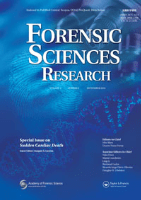
Forensic Sciences Research
Fostering Collaboration in Forensic ExcellenceForensic Sciences Research is a distinguished open-access journal published by Oxford University Press, dedicated to the interdisciplinary field of forensic sciences. Since its inception in 2016, the journal has rapidly established itself as a vital resource for researchers, professionals, and students in areas including analytical chemistry, anthropology, biochemistry, genetic studies, and various branches of forensic medicine. With an impressive range of impact factor metrics across multiple categories—including Q1 rankings in Anthropology for 2023—this journal provides unparalleled access to high-quality research while facilitating the dissemination of innovative ideas and methodologies in forensic science. Researchers benefit from the journal's extensive Scopus ranking, which showcases its influential position within the academic community. The open-access model allows global accessibility, ensuring that vital forensic research reaches a diverse audience and contributes to advancements in public safety and legal processes. For those engaged in the practical realities of forensic investigation or the theoretical underpinnings of the field, Forensic Sciences Research is an indispensable journal that continues to advance knowledge and foster collaboration within the forensic community.

Anil Aggrawals Internet Journal of Forensic Medicine and Toxicology
Advancing Forensic Insights for a Safer TomorrowAnil Aggrawals Internet Journal of Forensic Medicine and Toxicology, an esteemed publication in the field of forensic medicine and toxicology, is dedicated to disseminating innovative research and critical insights since 2000. Published by ANIL AGGRAWALS INTERNET JOURNAL FORENSIC MEDICINE & TOXICOLOGY, the journal caters to professionals, researchers, and students keen on advancing their understanding of forensic science, including its intersections with law and public health. Although it currently holds a Q4 quartile ranking in Law, Pathology and Forensic Medicine, and Toxicology, the journal provides a vital platform for underrepresented studies, encouraging a diverse range of scholarly contributions. With its open access model, the journal enhances visibility and accessibility, ensuring that valuable research can reach a wider audience. As the journal continues to evolve, it plays a crucial role in bridging theoretical knowledge and practical applications, thereby enriching the discourse within its fields of study and fostering inter-disciplinary collaborations.
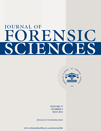
JOURNAL OF FORENSIC SCIENCES
JOURNAL OF FORENSIC SCIENCES is a premier publication dedicated to advancing the field of forensic science through high-quality research and innovation. Published by Wiley, this journal has been a reliable source of cutting-edge findings since its inception in 1961, with a continued commitment to excellence expected through 2024. With an ISSN of 0022-1198 and an E-ISSN of 1556-4029, the journal covers critical aspects of forensic medicine, including genetics, pathology, and molecular biology. Notably, it holds a Q2 ranking in Pathology and Forensic Medicine, reflecting its high impact and relevance in the field. Researchers and professionals benefit from comprehensive access to groundbreaking studies and discussions that drive advancements in forensic methodologies and technologies. While not an open access journal, its impact factor and rigorous peer-review process ensure that every article contributes significantly to the body of forensic science knowledge. Whether you are a seasoned forensic expert or an aspiring student, the JOURNAL OF FORENSIC SCIENCES serves as an essential resource for cutting-edge research and discoveries.
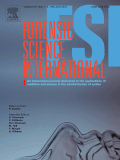
Forensic Science International
Empowering Global Collaboration in Forensic ResearchForensic Science International is a premier journal published by Elsevier Ireland Ltd, dedicated to advancing the field of forensic science through interdisciplinary research and scholarship. Since its inception in 1978, this esteemed journal has provided a platform for vital research, receiving recognition in the Q1 category for both Law and Pathology and Forensic Medicine as of 2023, underscoring its significant impact in these domains. It currently ranks 54th out of 1025 journals in Social Sciences - Law and 51st out of 208 in Medicine - Pathology and Forensic Medicine, placing it in the top echelons of academic journals according to Scopus metrics. Forensic Science International transitioned to Open Access in 2019, ensuring that critical findings are widely available to the global research community and enhancing collaboration among forensic professionals. With a forward-looking scope that evolves to meet the challenges and innovations of forensic science, this journal remains a pivotal resource for researchers, practitioners, and students who are committed to the continued advancement of forensic science and its applications in legal contexts.

Scandinavian Journal of Forensic Science
Transforming forensic insights into societal impact.The Scandinavian Journal of Forensic Science is a premier open-access journal published by SCIENDO since 2012, dedicated to advancing the field of forensic science. With its ISSN 2353-0707, this journal provides a platform for researchers, professionals, and students to disseminate their findings on various aspects of forensic investigations, including but not limited to forensic biology, chemistry, toxicology, and crime scene analysis. The journal plays a vital role in promoting collaboration and knowledge exchange among forensic practitioners and academics, ensuring that cutting-edge research is accessible to all. As a part of the reputable SCIENDO publishing group, the Scandinavian Journal of Forensic Science upholds high standards of peer review and editorial rigor, making it an essential resource for those involved in the forensic science community. Readers can benefit from its open-access model, which fosters wide dissemination and enhances the visibility of published works, ultimately contributing to the societal impact of forensic research.